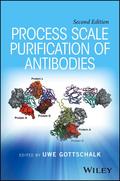Process Scale Purification of Antibodies

2. Auflage Mai 2017
752 Seiten, Hardcover
Wiley & Sons Ltd
Promoting a continued and much-needed renaissance in biopharmaceutical manufacturing, this book covers the different strategies and assembles top-tier technology experts to address the challenges of antibody purification.
* Updates existing topics and adds new ones that include purification of antibodies produced in novel production systems, novel separation technologies, novel antibody formats and alternative scaffolds, and strategies for ton-scale manufacturing
* Presents new and updated discussions of different purification technologies, focusing on how they can address the capacity crunch in antibody purification
* Emphasizes antibodies and innovative chromatography methods for processing
Preface
Chapter 1. Introduction
Elizabeth Kwong
1.1 Overcoming Challenges in big pharma and evolution of start-ups
1.2 Overview of activities involved in current drug discovery and development
1.3 Value of the right formulation at the right time
References
Chapter 2: Lead identification/optimization
DR MEI WONG AND DR MARK MCALLISTER
2.1 Introduction
2.2 Early characterization of compounds
2.3 Formulation approaches in drug discovery
2.4 Conclusion
References
Chapter 3 : Oral Drug Formulation Development In Pharmaceutical Lead Selection Stage
SHAYNE COX GAD, PH.D., D.A.B.T., ATS
3.1 Introduction
3.2 Formulation Considerations in Lead Selection Stage
3.3 Formulation Supporting Toxicology Studies
3.4 Technique of oral administration
3.5 Concluding Remarks
References
Chapter 4: Bridging End Of Discovery To Regulatory Filing: Formulations For IND- And Registration-Enabling Nonclinical Studies
Evan A. Thackaberry, Ph.D., D.A.B.T., Genentech, Inc.
4.1 Introduction
4.2 Formulation Selection for GLP Nonclinical Safety Studies
4.3 Dose Selection and Test Article Requirements for Nonclinical Toxicology Studies
4.4 Phase Appropriate Nonclinical Formulation Strategy
4.5 Methods of Test Article Administration
4.6 Formulation Tolerability across Species and Study Designs
4.7 The relationship between clinical and nonclinical formulations
4.8 Conclusions
References
Chapter 5: Planning The First Clinical Trials With Clinical Manufacturing Organization (CMO)
Elizabeth Kwong, Ph.D. and Caroline McGregor, Ph.D.
5.1 Reasons for Outsourcing
5.2 Considerations for Outsourcing
5.3 Timing of CMO selection
5.4 Pre-CMO selection Background information/preparation
5.5 Selection of CMO
5.6 Final thoughts
5.7 Abbreviations
References
Chapter 6: Formulation Strategies for High Dose Toxicology Studies: Case Studies
Dennis H. Leung, Pierre Daublain, Mengwei Hu, Kung-I Feng
6.1 ntroduction
6.2 General
6.3 Nanosuspension Formulation
Case Study 1 - Nanosuspension Formulation for Increased Maximum Dose and Systemic Drug Exposure
6.4 Amorphous Solid Dispersion Formulations
Case Study 2 - Amorphous Solid Dispersion Formulation for Resolving Complex Polymorphism Challenges
Case Study 3 - Amorphous Solid Dispersion Formulation for Improving Oral Absorption
Reference
Chapter 7: Formulation, Analytical And Regulatory Strategies For First In Human Clinical Trials
Lorenzo Capretto, Gerard Byrne, Sarah Trenfield, Lee Dowden and Steven Booth
7.1 INTRODUCTION
7.2 PLANNING AND EXECUTING THE FIH TRIAL
7.3 FORMULATION DEVELOPMENT
7.4 ANALYTICAL DEVELOPMENT
7.5 INFORMATION NEEDED IN PREPARATION OF REGULATORY SUBMISSION
7.6 CONCLUSIONS
Reference
Index


